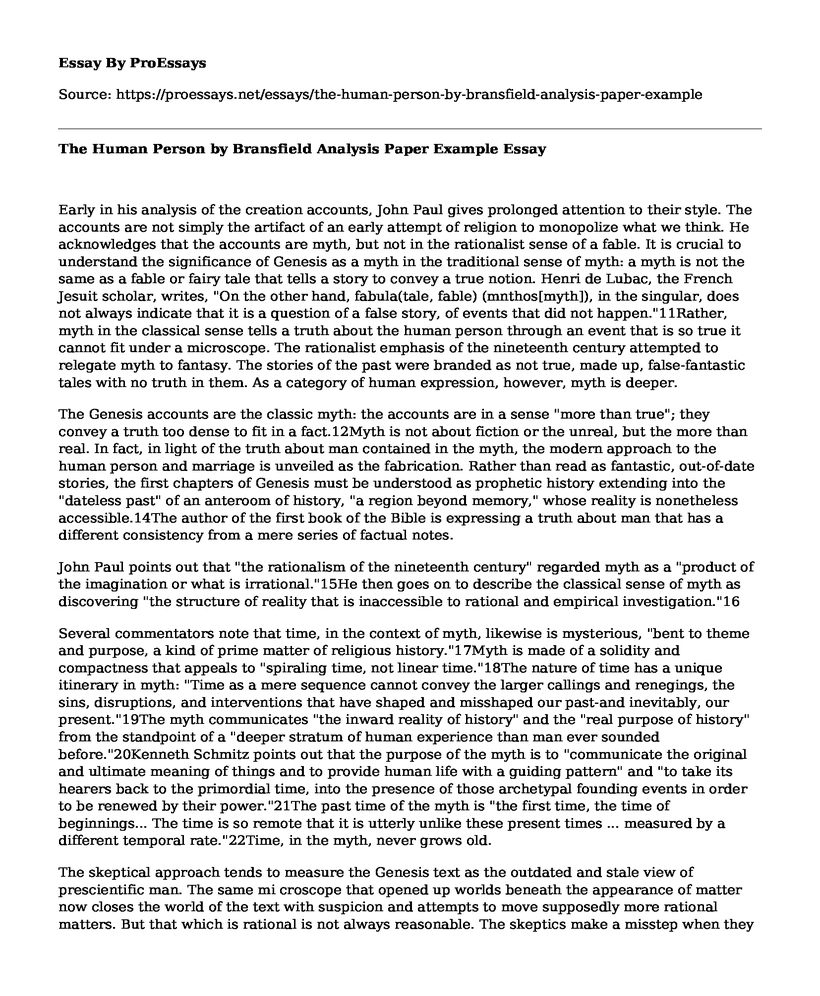Early in his analysis of the creation accounts, John Paul gives prolonged attention to their style. The accounts are not simply the artifact of an early attempt of religion to monopolize what we think. He acknowledges that the accounts are myth, but not in the rationalist sense of a fable. It is crucial to understand the significance of Genesis as a myth in the traditional sense of myth: a myth is not the same as a fable or fairy tale that tells a story to convey a true notion. Henri de Lubac, the French Jesuit scholar, writes, "On the other hand, fabula(tale, fable) (mnthos[myth]), in the singular, does not always indicate that it is a question of a false story, of events that did not happen."11Rather, myth in the classical sense tells a truth about the human person through an event that is so true it cannot fit under a microscope. The rationalist emphasis of the nineteenth century attempted to relegate myth to fantasy. The stories of the past were branded as not true, made up, false-fantastic tales with no truth in them. As a category of human expression, however, myth is deeper.
The Genesis accounts are the classic myth: the accounts are in a sense "more than true"; they convey a truth too dense to fit in a fact.12Myth is not about fiction or the unreal, but the more than real. In fact, in light of the truth about man contained in the myth, the modern approach to the human person and marriage is unveiled as the fabrication. Rather than read as fantastic, out-of-date stories, the first chapters of Genesis must be understood as prophetic history extending into the "dateless past" of an anteroom of history, "a region beyond memory," whose reality is nonetheless accessible.14The author of the first book of the Bible is expressing a truth about man that has a different consistency from a mere series of factual notes.
John Paul points out that "the rationalism of the nineteenth century" regarded myth as a "product of the imagination or what is irrational."15He then goes on to describe the classical sense of myth as discovering "the structure of reality that is inaccessible to rational and empirical investigation."16
Several commentators note that time, in the context of myth, likewise is mysterious, "bent to theme and purpose, a kind of prime matter of religious history."17Myth is made of a solidity and compactness that appeals to "spiraling time, not linear time."18The nature of time has a unique itinerary in myth: "Time as a mere sequence cannot convey the larger callings and renegings, the sins, disruptions, and interventions that have shaped and misshaped our past-and inevitably, our present."19The myth communicates "the inward reality of history" and the "real purpose of history" from the standpoint of a "deeper stratum of human experience than man ever sounded before."20Kenneth Schmitz points out that the purpose of the myth is to "communicate the original and ultimate meaning of things and to provide human life with a guiding pattern" and "to take its hearers back to the primordial time, into the presence of those archetypal founding events in order to be renewed by their power."21The past time of the myth is "the first time, the time of beginnings... The time is so remote that it is utterly unlike these present times ... measured by a different temporal rate."22Time, in the myth, never grows old.
The skeptical approach tends to measure the Genesis text as the outdated and stale view of prescientific man. The same mi croscope that opened up worlds beneath the appearance of matter now closes the world of the text with suspicion and attempts to move supposedly more rational matters. But that which is rational is not always reasonable. The skeptics make a misstep when they assume that the author of Genesis was trying to convey scientific facts. The author's intention was never to do that, but show transcendent truth: the "very telling of the myth meant to provide a sort of narrative bridge that is to take its hearers back to the primordial time, into the presence of those ar- chetypal founding events in order to be renewed by their power communicate the freshness of that beginning..."23The Genesis accounts do not attempt to simply gather the secular lineage of human facts into a pure sequential chronicle of temporal history Rather, the texts account for the panoramic design of "the hidden glories of charity the nakedness of history"24The creation accounts have something to offer that cannot be obtained anywhere else. They relay the events that reveal the deep meaning of the identity of man.
Reference
Bransfield, J. Brian. The Human Person . Pauline Books and Media. Kindle Edition.
Cite this page
The Human Person by Bransfield Analysis Paper Example. (2022, Sep 26). Retrieved from https://proessays.net/essays/the-human-person-by-bransfield-analysis-paper-example
If you are the original author of this essay and no longer wish to have it published on the ProEssays website, please click below to request its removal:
- Comparison Between Plato's Allegory to The Truman Show
- Dennis Kearny and Wong Chin-Fu Paper Example
- Essay Sample on Harriet Tubman's Fight for Civil Rights: A Historical Perspective
- Essay on Comfort Women: Filipinas' Stories of Prostitution & Slavery Under Japanese Military
- Essay Example on Steve Irwin: Wildlife Conservationist, Educator & TV Star
- Essay on Women Pivotal in Civil War: Volunteering, Nursing, Advocating, Spying, and More
- The Book of Amos: Ancient Prophecy & Posthumous Editing - Essay Sample







